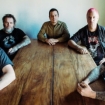If there were a Guinness World Record for longest sustained metal scream, Neurosis singer-guitarist Scott Kelly would have a lock on it. At the climax of the song "To the Wind," off his band's cataclysmic new full-length, Given to the Rising, he roars out the title phrase and holds the last word for a jaw-dropping, vein-bulging 29 seconds. He's still not sure how he pulled it off.
"I don't even know where that came from," he says with a chuckle, pausing to mull it over. "Something just broke loose. I saw my life pass before my eyes. I'm not even kidding, man. It took me about three or four minutes to recover."
Cofrontman Steve Von Till, who was looking on, thunderstruck, from the studio control room while Kelly let out his primal scream, has his own theory—and a rather mystical one at that. "It's one of those things. When you commit yourself to music like this, you have to embody the spirit of it, and you have to open your physical being to having it flow right up through the center of the earth, and up through your spinal cord, and up out your head," he says. "It's actually disappointing if you don't reach a state where you are no longer conscious of what you are doing. That's some sort of magical experience that we've discovered through music. It's some kind of full-on meditation."
It doesn't take long to figure out that Neurosis take their craft a hell of a lot more seriously than your average bunch of metal or hardcore mosh-starters. As Kelly puts it, "Music is my religion," and his bandmates would likely say the same. Since their formation in 1985, through stints on the first two Ozzfests and opening for Pantera, Neurosis have been spreading their faith to a fervent cult following. Their epic, post-metal sound echoes resoundingly in the music of Mastodon, Isis, Gojira, and a gazillion other bands, while everyone from Lamb of God's Mark Morton to Fear Factory's Burton C. Bell to Hatebreed's Sean Martin proudly pose for photos in their Neurosis T-shirts. The band rarely plays live anymore, which has only added to its mystique, as has the members' almost ascetic refusal to compromise their vision and devout abidance to the DIY ethos. (Neurosis manage themselves, book their own shows, and release their own records on their label, Neurot.) Sticking to their principles has come with a price—all the bandmates have to work full-time day jobs to pay the bills—but it has also taken them to Given to the Rising, Neurosis' darkest, heaviest, and greatest album in almost a decade, and one that promises to convert many new disciples.
Written across three states (Kelly lives in Oregon and Von Till in Idaho, while bassist Dave Edwardson, drummer Jason Roeder, and keyboardist Noah Landis all reside in Northern California), recorded in just three days, and mixed in three more (with infamous producer Steve Albini, who has worked with Neurosis since 1999's Times of Grace), Given to the Rising sees these grizzled veterans channeling all their years of experience, fusing the seismic, suffocating fury of their earlier work with the more subtle textures and melodicism of their latter days. As for why they've made such an especially dark, aggressive record at this point in their careers, neither Kelly nor Von Till can really explain.
"There's no preconceived plans to what we do, there's no cerebral notions. This isn't intellectual music—it's very much gut music," Von Till says. "We're naturally introspective, which is a somber—not a negative, but a dark—mood. If you're a truly self-reflective person, then occasionally you take yourself through the winter of the soul."
Talking to Kelly and Von Till is something like chatting with two of the Spartan warriors from the movie 300. It's not that they're wearing leather Speedos or baring bronzen six-packs; it's that they speak about their band in bold, quasi-religious, "honor and glory"–type language. Words like commitment, sacrifice, surrender, and spirit come up a lot. It's no wonder that Neurosis have their own battle-ready motto, "Strength and Vision," which you can see emblazoned on many of their T-shirts and hoodies; the bandmates see their work as something of a war. "An internal, personal war with your demons and yourself," explains Von Till. "A war for making music that has any sort of soul in a world of imitation, a war against increasingly boring monoculture crap."
It's a battle the band has been fighting from the very beginning. When Oakland hardcore kids Kelly, Edwardson, and Roeder formed Neurosis 22 years ago, they were intent on creating more than just another rock band. (Von Till joined in 1990, Landis in '92.) The teenagers spent the first two weeks "not even really playing, just talking," recalls Kelly, "trying to lay the foundation for something that would last a lifetime." They wrote a list of six bands—"the only bands that matter"—on a piece of paper and stuck it up in their first practice space: Black Sabbath, Black Flag, Pink Floyd, Joy Division, and two lesser-known names, crust-punks Amebix and Rudimentary Peni.
"Thing was about these bands, it wasn't just their music," says Kelly. "Somehow, we were lucky enough to realize, at 15, 16, 17, that there was something more going on. Joy Division is about as real and from the heart as it gets. Black Flag was so visceral and raw, so totally willing to do their own thing and thrive on the backlash."
The latter proved to be an important lesson to the young Neurosis, who were making few fans with their eight-minute, keyboard-laden songs. "Aw, people fucking hated it," Kelly chuckles. "We got up onstage with keyboards, and people just left." But Neurosis "so didn't give a fuck" and soldiered on, playing any venue—including pizza parlors and private homes—and with any band that would have them. "We played a lot of shows with NOFX and Green Day in those days," he notes.
It wasn't until after the release of Neurosis' watershed third album, 1992's Souls at Zero, that audiences slowly began to come around. Amazingly, so did the major labels—though Neurosis' creative obstinacy quickly made them back off. "We lived through that little post-Nirvana moment in time, when all these people were looking to sign…whatever," says Kelly. "We had all these offers thrown our way, and we always said the same thing: If we're gonna go to your major label, the first thing you're gonna do is give us complete control in everything we do and you'll have no say in it, and the second thing you're gonna do is give us a lot of your money so that we know that your commitment is strong. And it was funny how many times it got to that point, 'Oh, yeah, absolutely. Great. Yep, so we're gonna send you a contract.' And then it would never be there."
Neurosis encountered similar duplicity from many bigger metal bands, which, according to the singer-guitarist, "were saying things like, 'Oh, we really want to take you guys on tour. You guys really mean a lot to us,' and blah, blah, blah. And we were like, 'Great, send us an offer.' It never happened."
One band proved to be the exception: Pantera. "We hit New Orleans on this tour [in 1996]. Phil [Anselmo] came out, and I remember him specifically saying, 'We want to take you guys out. We're gonna send you an offer. What do you guys need to survive on the road?' We told him, and he said, 'Look out for the mail.' And it arrived within a week," says Kelly. "When we showed up on that tour, the first day, [Pantera bassist] Rex (Brown] was like, 'Hey, man, we got this dressing room, we don't use it. There's food in there, it's always warm. If you guys need it, feel free.' Just treated us like family right from the start. We were touring in a fucking van with no heat, and they would be like, 'C'mon, man, a few of you guys get to stay in our bus tonight and at least get fucking warm.' They were just the most real dudes that we ran into in that whole [music industry] world. That's a fucking shallow world, man, and they were just nothing like that. It was a really great experience."
What wasn't so great was Neurosis' reception from the audiences on the tour. "People were shocked most of the time. I can remember many times looking off to the side stage and seeing the Pantera guys just fucking laughing," Kelly recalls with a chuckle. "I mean, 99 percent of the people at those shows had no clue who we were or what we were about. And we had so much to offer them at that point." Neurosis were, after all, supporting what many still consider to be their best album, 1996's Through Silver in Blood (their Relapse debut), and their live show had recently expanded to include psychedelic video projections, making it a truly multisensory experience. But the average metalhead wasn't ready for it, and when Neurosis played the first two Ozzfests in '96 and '97—invited by Sharon Osbourne, who had been turned on to them by a music writer/fan—the response wasn't much warmer. Still, according to Kelly, he and his bandmates got a lot out of the experience, especially on the inaugural tour, which was headlined by Black Sabbath. Opening for Sabbath, he says, was "like getting to go to college. We were front and center every night, every song, just trying to glean some information from what they were doing."
More than anything, what the Neurosis guys were learning, however, was that they had to find a different way to operate as a band. As they got older, got married, and had children, the touring life was taking an increasing toll and looking increasingly pointless. "We'd already caught a glimpse of what the major-label fucking music world was about, and we knew we had no place there, and we knew that our kids were just sitting at home waiting to be near their dads," says Kelly. "It just reached a point where we were all sitting in the van outside this club we were playing for the third time that year, and we were like, Why are we here? We've done this. Why did we start this band? It had nothing to do with touring. Touring wasn't even on the horizon when we started out. It was about music and creating a family for each other, and that was it. And that's always been it."
So, as the millennium turned, the band gave up full-time touring, weaned themselves off their label, Relapse, got day jobs—Kelly is a welder and a stagehand at a repertory theater, Von Till is a teacher, Edwardson works in a warehouse selling books, Roeder runs a plant nursery, and Landis is the sound guy at a museum—and refocused the rest of their time and energy on their families and their music. They started Neurot, which is run in its day-to-day operations by Von Till's wife, Kristin, and has since put out 50-plus albums by artists like Isis, Made Out of Babies, Battle of Mice, and Red Sparowes. They've worked on numerous side projects—including, most recently, the supergroup of sorts Shrinebuilder, which Kelly just joined alongside Scott "Wino" Weinrich (the Hidden Hand, Saint Vitus, the Obsessed, etc.) and Sleep's former rhythm section, Al Cisneros and Chris Hakius, currently of OM. ("I'm super, super excited about it, and the initial riffs are really good," reports Kelly, though he cautions that most likely nothing will be released until '08.) The singer-guitarist also coruns the podcast site combatmusicradio.com, which focuses on heavy music and blood sports and until recently boasted an old Neurosis friend, Anselmo, as its boxing commentator.
Kelly and Von Till clearly feel that taking control of every aspect of their various projects and reining in their touring schedule has only made Neurosis even more passionate about what they do. "Now we play when we want, where we want, and it's much more of a treasured event. People come from far away every time, and it makes it special… It makes it special for us. I mean, we're so grateful and appreciative that people think that highly of what we do, 'cause this is just personal music for us. It's not for other people to enjoy—we just have to do this," says Von Till. "And now we're at a point where everything we do is extremely tied into a more pure ethic of the do-it-yourself attitude that we came from, and it's just more gratifying this way."
They're both also very thankful to still be playing with the same group of individuals after nearly two decades. Such longevity is hard to rare in the fickle music industry, but Neurosis have every intention of staying true to their founding concept of being a band to "last a lifetime."
"I've had some people tell me that it's a really dramatic thing to say or whatever," he notes. And then, sounding once again very much like a Spartan warrior, he adds: "But it's the truth: Neurosis is going till one or all of us is dead."








